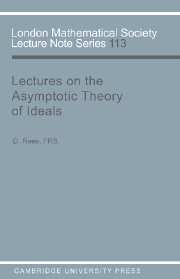Book contents
- Frontmatter
- Contents
- Preface
- Introduction
- Chapter 1 Graded Rings and Modules
- Chapter 2 Filtrations and Noether Filtrations
- Chapter 3 The Theorems of Matijevic and Mori-Nagata
- Chapter 4 The Valuation Theorem
- Chapter 5 The Strong Valuation Theorem
- Chapter 6 Ideal Valuations (1)
- Chapter 7 Ideal Valuations (2)
- Chapter 8 The Multiplicity Function associated with a Filtration
- Chapter 9 The Degree Function of a Noether Filtration
- Chapter 10 The General Extension of a Local Ring
- Chapter 11 General Elements
- Chapter 12 Mixed Multiplicities and the Generalised Degree Formula
- Bibliography
- Index
- Index of Symbols
Chapter 5 - The Strong Valuation Theorem
Published online by Cambridge University Press: 17 September 2009
- Frontmatter
- Contents
- Preface
- Introduction
- Chapter 1 Graded Rings and Modules
- Chapter 2 Filtrations and Noether Filtrations
- Chapter 3 The Theorems of Matijevic and Mori-Nagata
- Chapter 4 The Valuation Theorem
- Chapter 5 The Strong Valuation Theorem
- Chapter 6 Ideal Valuations (1)
- Chapter 7 Ideal Valuations (2)
- Chapter 8 The Multiplicity Function associated with a Filtration
- Chapter 9 The Degree Function of a Noether Filtration
- Chapter 10 The General Extension of a Local Ring
- Chapter 11 General Elements
- Chapter 12 Mixed Multiplicities and the Generalised Degree Formula
- Bibliography
- Index
- Index of Symbols
Summary
Preliminaries.
From now on, we restrict attention to noether filtrations which take only non-negative values, and all noether filtrations mentioned will be assumed to satisfy this condition. It follows that the symbol v(f-) will never occur, and we will therefore write v(f) in place of v(f+).
We now consider the following question. Suppose that A is a noetherian ring and that f is a noether filtration on A. Then it is natural to ask whether the integral closure f* of f is equivalent to f. Since f*(x) ≥ f(x) for all x, this is equivalent to the statement that there exists a constant K such that f(x) ≤ f*(x) ≤ f(x) + K for all x. An equivalent formulation is that u-kG(f) ⊇ G(f*), which in turn is equivalent to G(f*) being a finite G(f)-module, and hence implies that f* is also a noether filtration.
Note that the restriction to non-negative noether filtrations implies that f and f* are equivalent if and only if f* is a noether filtration. For in this case A0(f*) = A0(f) = A, and f* is a noether filtration if and only if G(f*) is finitely generated over A. But this is equivalent to G(f*) being finitely generated over G(f), and since G(f*) is an integral extension of G(f), this in turn is equivalent to G(f*) being a finite G(f)-module and hence equivalent to f.
- Type
- Chapter
- Information
- Lectures on the Asymptotic Theory of Ideals , pp. 74 - 84Publisher: Cambridge University PressPrint publication year: 1988

